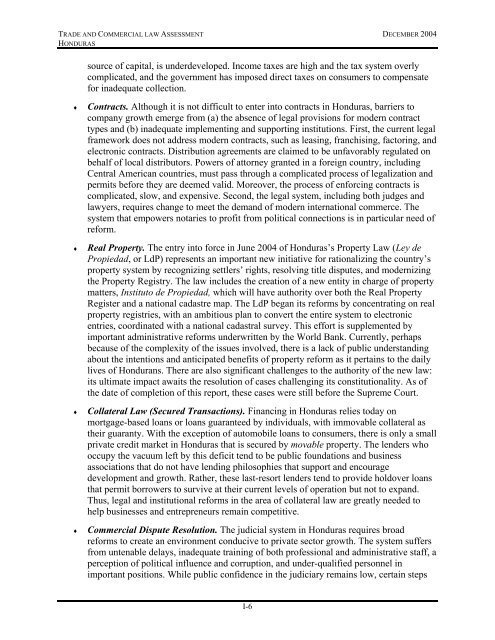Trade and Commercial Law Assessment - Honduras - Economic ...
Trade and Commercial Law Assessment - Honduras - Economic ...
Trade and Commercial Law Assessment - Honduras - Economic ...
You also want an ePaper? Increase the reach of your titles
YUMPU automatically turns print PDFs into web optimized ePapers that Google loves.
TRADE AND COMMERCIAL LAW ASSESSMENT DECEMBER 2004<br />
HONDURAS<br />
♦<br />
♦<br />
♦<br />
♦<br />
source of capital, is underdeveloped. Income taxes are high <strong>and</strong> the tax system overly<br />
complicated, <strong>and</strong> the government has imposed direct taxes on consumers to compensate<br />
for inadequate collection.<br />
Contracts. Although it is not difficult to enter into contracts in <strong>Honduras</strong>, barriers to<br />
company growth emerge from (a) the absence of legal provisions for modern contract<br />
types <strong>and</strong> (b) inadequate implementing <strong>and</strong> supporting institutions. First, the current legal<br />
framework does not address modern contracts, such as leasing, franchising, factoring, <strong>and</strong><br />
electronic contracts. Distribution agreements are claimed to be unfavorably regulated on<br />
behalf of local distributors. Powers of attorney granted in a foreign country, including<br />
Central American countries, must pass through a complicated process of legalization <strong>and</strong><br />
permits before they are deemed valid. Moreover, the process of enforcing contracts is<br />
complicated, slow, <strong>and</strong> expensive. Second, the legal system, including both judges <strong>and</strong><br />
lawyers, requires change to meet the dem<strong>and</strong> of modern international commerce. The<br />
system that empowers notaries to profit from political connections is in particular need of<br />
reform.<br />
Real Property. The entry into force in June 2004 of <strong>Honduras</strong>’s Property <strong>Law</strong> (Ley de<br />
Propiedad,<br />
or LdP) represents an important new initiative for rationalizing the country’s<br />
property system by recognizing settlers’ rights, resolving title disputes, <strong>and</strong> modernizing<br />
the Property Registry. The law includes the creation of a new entity in charge of property<br />
matters, Instituto de Propiedad, which will have authority over both the Real Property<br />
Register <strong>and</strong> a national cadastre map. The LdP began its reforms by concentrating on real<br />
property registries, with an ambitious plan to convert the entire system to electronic<br />
entries, coordinated with a national cadastral survey. This effort is supplemented by<br />
important administrative reforms underwritten by the World Bank. Currently, perhaps<br />
because of the complexity of the issues involved, there is a lack of public underst<strong>and</strong>ing<br />
about the intentions <strong>and</strong> anticipated benefits of property reform as it pertains to the daily<br />
lives of Hondurans. There are also significant challenges to the authority of the new law:<br />
its ultimate impact awaits the resolution of cases challenging its constitutionality. As of<br />
the date of completion of this report, these cases were still before the Supreme Court.<br />
Collateral <strong>Law</strong> (Secured Transactions). Financing in <strong>Honduras</strong> relies today on<br />
mortgage-based loans or loans guaranteed by individuals, with immovable collateral as<br />
their guaranty. With the exception of automobile loans to consumers, there is only<br />
a small<br />
private credit market in <strong>Honduras</strong> that is secured by movable property. The lenders who<br />
occupy the vacuum left by this deficit tend to be public foundations <strong>and</strong> business<br />
associations that do not have lending philosophies that support <strong>and</strong> encourage<br />
development <strong>and</strong> growth. Rather, these last-resort lenders tend to provide holdover<br />
loans<br />
that permit borrowers to survive at their current levels of operation but not to exp<strong>and</strong>.<br />
Thus, legal <strong>and</strong> institutional reforms in the area of collateral law are greatly needed to<br />
help businesses <strong>and</strong> entrepreneurs remain competitive.<br />
<strong>Commercial</strong> Dispute Resolution. The judicial system in <strong>Honduras</strong> requires broad<br />
reforms to create an environment conducive to private sector<br />
growth. The system suffers<br />
from untenable delays, inadequate training of both professional <strong>and</strong> administrative staff, a<br />
perception of political influence <strong>and</strong> corruption, <strong>and</strong> under-qualified personnel in<br />
important positions. While public confidence in the judiciary remains low, certain steps<br />
I-6

















